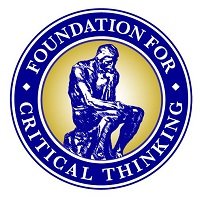
Wednesday December 30th, 2020
8:00 p.m. Eastern Standard Time (5:00 p.m. Pacific)
Duration: 90 Minutes
The elements of reasoning (also known as the elements of thoughts, components of thinking, etc.), the intellectual standards, and the intellectual traits (or intellectual virtues) together form the bedrock of critical thinking theory. Understanding these conceptual sets and their relationships with each other is the first step in elevating one’s reasoning, while deepening that comprehension through continued study and practice is a lifelong journey. Most people who begin to learn the fundamentals of critical thinking stop learning before they have a chance to adequately internalize them, and therefore to use them with significant consistency and effectiveness.
This webinar asks you to complete several activities ahead of time in the Center for Critical Thinking Community Online, all relating to the three concepts above, and to formulate questions that you can bring to the session. Therefore, Dr. Elder will presuppose that attendees have studied the subject matter through these activities, or previously through attending our conferences, academies, or courses. This webinar will be almost entirely based on the questions you bring to the discussion.
The following readings and activities are recommended prior to the webinar:
1) Review Page 14 in The Miniature Guide to Critical Thinking Concepts & Tools.
2) Watch ‘Critical Thinking and the Basic Elements of Thought.’
3) Complete the activity ‘Analyze the Logic of a Problem or Issue’ after reading the template and example at the top of the page.
4) Review pages 19 and 20 in The Miniature Guide to Critical Thinking Concepts & Tools.
5) Watch ‘Critical Thinking - Standards of Thought - Part 1.’
Also watch ‘Critical Thinking - Standards of Thought - Part 2.’
6) Begin to Think About Intellectual Standards: after examining the diagram at the bottom of the page, complete the activities for at least four of the intellectual standards listed. The more you complete, the better you will understand how the various intellectual standards can be applied to the elements of thought.
7) Read ‘The Elements of Reasoning and the Intellectual Standards.’
8) Read ‘Valuable Intellectual Traits.’
9) Watch Parts 1-3 of ‘Intellectual Virtues by Dr. Linda Elder.’
10) Complete the activity ‘Articulate Your Own Definitions of Intellectual Virtues.’ (Activity begins halfway down the page.)
11) Examine the diagram on page 12 of The Miniature Guide to Critical Thinking Concepts & Tools. Write at least four examples of how applying a given intellectual standard to a given element of reasoning can help develop a given intellectual trait over time.
Example: ‘Checking my assumptions for accuracy can help me to develop intellectual humility.’
Remember that you need a Center for Critical Thinking Community Online account to participate in this discussion. If you are brand new, a 30-day free trial is available.
Note: All webinar registrants will be emailed within 48 hours of the start of the webinar with a link to where it can be accessed. In some cases, your email server may incorrectly filter the email as spam, so please check your spam folder as well.
Please do not pass this message by.
CRITICAL THINKING IS AT RISK.
Here are some of the big reasons why:
As you see, increasingly powerful trends against the teaching, learning, and practice of critical thinking entail extraordinary challenges to our mission. To continue our work, we must now rely upon your financial support. If critical thinking matters to you, please click here to contribute what you can today.
WE NEED YOUR HELP TO CONTINUE OUR WORK.
Thank you for your support of ethical critical thinking.